厦门大学:《概率论与数理统计 Probability and Statistics for Economists》课程教学课件(英文讲稿,2019)Chapter 02 Foundation of Probability Theory
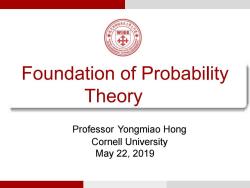
,院究所膏装南鱼王季大門厦鼻 NG YA Foundation of Probability Theory Professor Yongmiao Hong Cornell University May22,2019
Foundation of Probability Theory Professor Yongmiao Hong Cornell University May 22, 2019
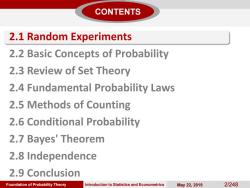
CONTENTS 2.1 Random Experiments 2.2 Basic Concepts of Probability 2.3 Review of Set Theory 2.4 Fundamental Probability Laws 2.5 Methods of Counting 2.6 Conditional Probability 2.7 Bayes'Theorem 2.8 Independence 2.9 Conclusion Foundation of Probability Theory Introduction to Statistics and Econometrics May22,2019 2/248
Foundation of Probability Theory Introduction to Statistics and Econometrics May 22, 2019 2/248 2.1 Random Experiments 2.2 Basic Concepts of Probability 2.3 Review of Set Theory 2.4 Fundamental Probability Laws 2.5 Methods of Counting 2.6 Conditional Probability 2.7 Bayes' Theorem 2.8 Independence 2.9 Conclusion CONTENTS
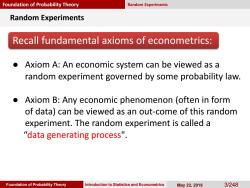
Foundation of Probability Theory Random Experiments Random Experiments Recall fundamental axioms of econometrics: Axiom A:An economic system can be viewed as a random experiment governed by some probability law. Axiom B:Any economic phenomenon (often in form of data)can be viewed as an out-come of this random experiment.The random experiment is called a "data generating process". Foundation of Probability Theory Introduction to Statistics and Econometrics May22,2019 3/248
Foundation of Probability Theory Introduction to Statistics and Econometrics May 22, 2019 3/248 Recall fundamental axioms of econometrics: ● Axiom A: An economic system can be viewed as a random experiment governed by some probability law. ● Axiom B: Any economic phenomenon (often in form of data) can be viewed as an out-come of this random experiment. The random experiment is called a “data generating process". Random Experiments Foundation of Probability Theory Random Experiments
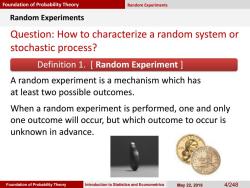
Foundation of Probability Theory Random Experiments Random Experiments Question:How to characterize a random system or stochastic process? Definition 1.Random Experiment A random experiment is a mechanism which has at least two possible outcomes. When a random experiment is performed,one and only one outcome will occur,but which outcome to occur is unknown in advance. Foundation of Probability Theory Introduction to Statistics and Econometrics May22,2019 4/248
Foundation of Probability Theory Introduction to Statistics and Econometrics May 22, 2019 4/248 Random Experiments Random Experiments Question: How to characterize a random system or stochastic process? Definition 1. [ Random Experiment ] A random experiment is a mechanism which has at least two possible outcomes. When a random experiment is performed, one and only one outcome will occur, but which outcome to occur is unknown in advance. Foundation of Probability Theory
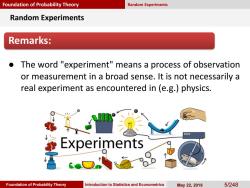
Foundation of Probability Theory Random Experiments Random Experiments Remarks: The word "experiment"means a process of observation or measurement in a broad sense.It is not necessarily a real experiment as encountered in (e.g.)physics. 000 Experiments Foundation of Probability Theory Introduction to Statistics and Econometrics May22,2019 5/248
Foundation of Probability Theory Introduction to Statistics and Econometrics May 22, 2019 5/248 Remarks: ● The word "experiment" means a process of observation or measurement in a broad sense. It is not necessarily a real experiment as encountered in (e.g.) physics. Random Experiments Foundation of Probability Theory Random Experiments
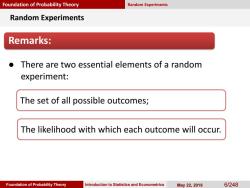
Foundation of Probability Theory Random Experiments Random Experiments Remarks: There are two essential elements of a random experiment: The set of all possible outcomes; The likelihood with which each outcome will occur. Foundation of Probability Theory Introduction to Statistics and Econometrics May22,2019 6/248
Foundation of Probability Theory Introduction to Statistics and Econometrics May 22, 2019 6/248 Remarks: ● There are two essential elements of a random experiment: Random Experiments Foundation of Probability Theory Random Experiments The set of all possible outcomes; The likelihood with which each outcome will occur
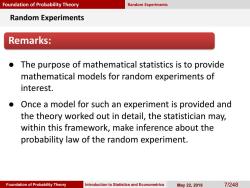
Foundation of Probability Theory Random Experiments Random Experiments Remarks: The purpose of mathematical statistics is to provide mathematical models for random experiments of interest. Once a model for such an experiment is provided and the theory worked out in detail,the statistician may, within this framework,make inference about the probability law of the random experiment. Foundation of Probability Theory Introduction to Statistics and Econometrics May22,2019 7/248
Foundation of Probability Theory Introduction to Statistics and Econometrics May 22, 2019 7/248 Remarks: ● The purpose of mathematical statistics is to provide mathematical models for random experiments of interest. ● Once a model for such an experiment is provided and the theory worked out in detail, the statistician may, within this framework, make inference about the probability law of the random experiment. Random Experiments Foundation of Probability Theory Random Experiments
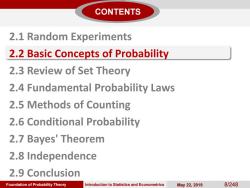
CONTENTS 2.1 Random Experiments 2.2 Basic Concepts of Probability 2.3 Review of Set Theory 2.4 Fundamental Probability Laws 2.5 Methods of Counting 2.6 Conditional Probability 2.7 Bayes'Theorem 2.8 Independence 2.9 Conclusion Foundation of Probability Theory Introduction to Statistics and Econometrics May22,2019 8/248
Foundation of Probability Theory Introduction to Statistics and Econometrics May 22, 2019 8/248 2.1 Random Experiments 2.2 Basic Concepts of Probability 2.3 Review of Set Theory 2.4 Fundamental Probability Laws 2.5 Methods of Counting 2.6 Conditional Probability 2.7 Bayes' Theorem 2.8 Independence 2.9 Conclusion CONTENTS
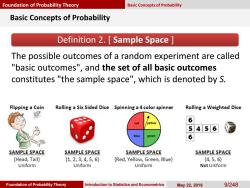
Foundation of Probability Theory Basic Concepts of Probability Basic Concepts of Probability Definition 2.Sample Space The possible outcomes of a random experiment are called "basic outcomes",and the set of all basic outcomes constitutes "the sample space",which is denoted by S. Flipping a Coin Rolling a Six Sided Dice Spinning a 4 color spinner Rolling a Weighted Dice 6 red yellow 545 6 blue green 6 SAMPLE SPACE SAMPLE SPACE SAMPLE SPACE SAMPLE SPACE Head,Tail} {1,2,3,4,5,6} (Red,Yellow,Green,Blue} {4,5,6 Uniform Uniform Uniform Not Uniform Foundation of Probability Theory Introduction to Statistics and Econometrics May22,2019 9/248
Foundation of Probability Theory Introduction to Statistics and Econometrics May 22, 2019 9/248 Basic Concepts of Probability Foundation of Probability Theory Basic Concepts of Probability Definition 2. [ Sample Space ] The possible outcomes of a random experiment are called "basic outcomes", and the set of all basic outcomes constitutes "the sample space", which is denoted by S
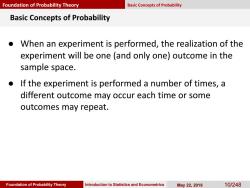
Foundation of Probability Theory Basic Concepts of Probability Basic Concepts of Probability When an experiment is performed,the realization of the experiment will be one (and only one)outcome in the sample space. If the experiment is performed a number of times,a different outcome may occur each time or some outcomes may repeat. Foundation of Probability Theory Introduction to Statistics and Econometrics May22,2019 10/248
Foundation of Probability Theory Introduction to Statistics and Econometrics May 22, 2019 10/248 Basic Concepts of Probability Foundation of Probability Theory Basic Concepts of Probability ● When an experiment is performed, the realization of the experiment will be one (and only one) outcome in the sample space. ● If the experiment is performed a number of times, a different outcome may occur each time or some outcomes may repeat
按次数下载不扣除下载券;
注册用户24小时内重复下载只扣除一次;
顺序:VIP每日次数-->可用次数-->下载券;
- 厦门大学:《概率论与数理统计 Probability and Statistics for Economists》课程教学资源(教学大纲,主讲:洪永淼).pdf
- 中国科学院数学与系统科学研究院:《高级计量经济学》课程教学资源(课件讲稿)第四章 Professor Yongmiao Hong.pdf
- 中国科学院数学与系统科学研究院:《高级计量经济学》课程教学资源(课件讲稿)第三章 Classical Linear Regression Model.pdf
- 中国科学院数学与系统科学研究院:《高级计量经济学》课程教学资源(课件讲稿)第二章 General Regression Analysis.pdf
- 中国科学院数学与系统科学研究院:《高级计量经济学》课程教学资源(课件讲稿)第一章 Introduction to Econometrics.pdf
- 厦门大学:《高级计量经济学》课程教学资源(课件讲稿)Introduction to Statistics and Econometrics.pdf
- 厦门大学:《高级计量经济学》课程教学资源(教学大纲)A Course on Advanced Econometrics(主讲:洪永淼).pdf
- 运城学院:《宏观经济学》课程教学资源(电子教案,打印版,负责人:李吉续).pdf
- 运城学院:《宏观经济学》课程教学资源(各章习题,含答案,打印版)第五章 国际经济的基本知识.pdf
- 运城学院:《宏观经济学》课程教学资源(各章习题,含答案,打印版)第四章 失业与通货膨胀.pdf
- 运城学院:《宏观经济学》课程教学资源(各章习题,含答案,打印版)第三章 凯恩斯的宏观经济政策主张.pdf
- 运城学院:《宏观经济学》课程教学资源(各章习题,含答案,打印版)第二章 凯恩斯的均衡国民收入理论.pdf
- 运城学院:《宏观经济学》课程教学资源(各章习题,含答案,打印版)第一章 福利经济学和微观经济政策.pdf
- 华东理工大学:《商业银行经营学》课程教学资源(PPT课件讲稿)第十四章 商业银行经营发展趋势.ppt
- 华东理工大学:《商业银行经营学》课程教学资源(PPT课件讲稿)第十三章 商业银行经营风险与内部控制.ppt
- 华东理工大学:《商业银行经营学》课程教学资源(PPT课件讲稿)第十二章 商业银行绩效评估.ppt
- 华东理工大学:《商业银行经营学》课程教学资源(PPT课件讲稿)第十章 国际业务.ppt
- 华东理工大学:《商业银行经营学》课程教学资源(PPT课件讲稿)第十一章 商业银行资产负债管理策略.ppt
- 华东理工大学:《商业银行经营学》课程教学资源(PPT课件讲稿)第九章 其他业务.ppt
- 华东理工大学:《商业银行经营学》课程教学资源(PPT课件讲稿)第八章 表外业务.ppt
- 厦门大学:《概率论与数理统计 Probability and Statistics for Economists》课程教学课件(英文讲稿,2019)Chapter 03 Random Variables and Univariate Probability Distributions.pdf
- 厦门大学:《概率论与数理统计 Probability and Statistics for Economists》课程教学课件(英文讲稿,2019)Chapter 10 Big Data, Machine Learning and Statistics.pdf
- 厦门大学:《概率论与数理统计 Probability and Statistics for Economists》课程教学课件(英文讲稿,2019)Chapter 05 Multivariate Probability Distributions.pdf
- 厦门大学:《概率论与数理统计 Probability and Statistics for Economists》课程教学课件(英文讲稿,2019)Chapter 06 Multivariate Probability Distributions.pdf
- 厦门大学:《概率论与数理统计 Probability and Statistics for Economists》课程教学课件(英文讲稿,2019)Chapter 07 Convergences and Limit Theorems.pdf
- 厦门大学:《概率论与数理统计 Probability and Statistics for Economists》课程教学课件(英文讲稿,2019)Chapter 08 Parameter Estimation and Evaluation.pdf
- 厦门大学:《概率论与数理统计 Probability and Statistics for Economists》课程教学课件(英文讲稿,2019)Chapter 09 Hypothesis Testing.pdf
- 厦门大学:《概率论与数理统计 Probability and Statistics for Economists》课程教学课件(英文讲稿,2019)Chapter 01 Introduction to Statistics and Econometrics.pdf
- 厦门大学:《概率论与数理统计 Probability and Statistics for Economists》课程教学课件(英文讲稿,2019)Chapter 04 Important Probability Distributions.pdf
- 厦门大学:《社会主义政治经济学 Socialist Political Economics》课程教学资源(PPT课件讲稿)导论(主讲:洪永淼).pptx
- 厦门大学:《社会主义政治经济学 Socialist Political Economics》课程教学资源(PPT课件讲稿)第二章 资本主义经济发展规律.pptx
- 厦门大学:《社会主义政治经济学 Socialist Political Economics》课程教学资源(PPT课件讲稿)第二章 附录——商品生产基本概念.pptx
- 厦门大学:《社会主义政治经济学 Socialist Political Economics》课程教学资源(PPT课件讲稿)马克思恩格斯社会主义思想的理论来源(主讲:侯金光).pdf
- 厦门大学:《社会主义政治经济学 Socialist Political Economics》课程教学资源(PPT课件讲稿)三十年代苏联党内斗争和大镇压(主讲:侯金光).pptx
- 厦门大学:《社会主义政治经济学 Socialist Political Economics》课程教学资源(PPT课件讲稿)彼得堡大学的经济学家们.pptx
- 厦门大学:《社会主义政治经济学 Socialist Political Economics》课程教学资源(PPT课件讲稿)第八章 西方学者关于社会主义的论争.pptx
- 厦门大学:《社会主义政治经济学 Socialist Political Economics》课程教学资源(PPT课件讲稿)第九章 新民主主义经济与社会主义改造(主讲:张兴祥).pptx
- 厦门大学:《社会主义政治经济学 Socialist Political Economics》课程教学资源(PPT课件讲稿)第十一章 从有计划的商品经济到市场经济.pptx
- 厦门大学:《社会主义政治经济学 Socialist Political Economics》课程教学资源(PPT课件讲稿)第十章 中国计划经济模式.pptx
- 厦门大学:《社会主义政治经济学 Socialist Political Economics》课程教学资源(PPT课件讲稿)第十三章 中国模式特征与发展趋势.pptx
